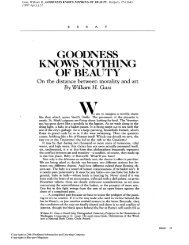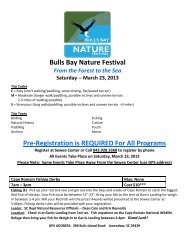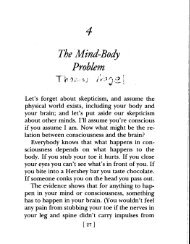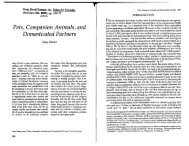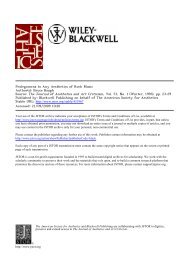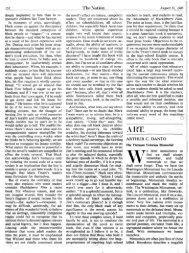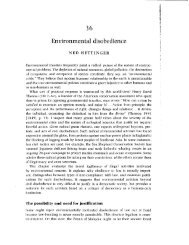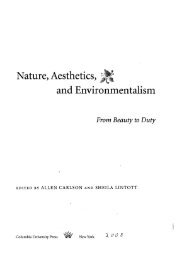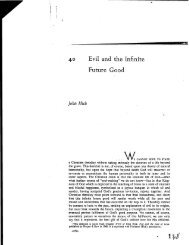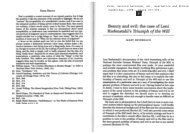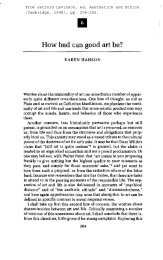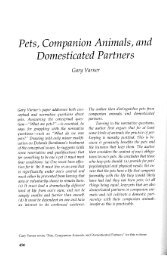Carl Cohen's 'Kind' Arguments For Animal Rights and Against ...
Carl Cohen's 'Kind' Arguments For Animal Rights and Against ...
Carl Cohen's 'Kind' Arguments For Animal Rights and Against ...
Create successful ePaper yourself
Turn your PDF publications into a flip-book with our unique Google optimized e-Paper software.
46 Nathan Nobis(1) If an individual is of a kind that lacks the capacity for free moral judgment, then heor she does not have moral rights.(2) Each animal is of a kind that lacks the capacity for free moral judgment.(3) Therefore, animals do not have moral rights.Call this ‘the “kind” argument against animal rights.’ Cohen’s remark suggests aseparate argument for the bolder conclusion that animals not only do not have rights,but that they cannot have rights, but that argument is worth serious attention only ifCohen shows that, as things actually are, animals do not have rights.These arguments are improvements over the Underst<strong>and</strong>able Misinterpretation in that,at least, they do not obviously appear to be subject to objections from cases of ‘marginal’humans. But Cohen’s case against animals can succeed only if he is able to showwhy these humans have rights, despite their lacking the capacity for moral judgment<strong>and</strong> (apparently) failing to meet his stated necessary condition for rights. Cohen thushas another ‘kind’ argument to attempt to circumvent that objection:(1*) If an individual is of a kind that possesses the capacity for free moral judgment,then he or she has moral rights.(2*) Each ‘marginal’ human is of a kind that possesses the capacity for free moraljudgment.(3*) Therefore, ‘marginal’ humans have moral rights.Cohen’s ‘kind’ arguments are not easy to evaluate since Cohen does not explain hispremises. In particular, he does not explain what he means by his use of the term‘kind.’ What ‘kinds’ are <strong>and</strong> what it is to be ‘of a kind’ is not obvious or clear. Since hisarguments depend on ‘marginal’ humans being of a kind that animals are not of (<strong>and</strong>could not be of ) <strong>and</strong> moral principles that appeal to ‘kinds’, it is doubly unfortunatethat he does not explain what he means.Thus, some interpretation is necessary. I will first attempt to underst<strong>and</strong> why thesecond premises of the ‘kind’ arguments, (2) <strong>and</strong> (2*), might be true: why are wesupposed to think that animals are not of a kind that has the capacity for free moraljudgment but that marginal humans are, even though they are unable to make moraljudgments? After some discussion of the problematic nature of these premises (includingan argument that [2*] is necessarily false), I settle on an interpretation that allowsfor them to be true. But I then argue that, given Cohen’s moral principles (1) <strong>and</strong> (1*),this interpretation has implications that are surprising: first, that animals have rights,<strong>and</strong>, second, the false <strong>and</strong> inconsistent implications that humans do <strong>and</strong> do not haverights <strong>and</strong> that even everything does <strong>and</strong> does not have rights. These consequencesshow that Cohen’s strategy is seriously <strong>and</strong> irredeemably flawed.<strong>For</strong> the sake of this first set of arguments I accept Cohen’s moral principles (1) <strong>and</strong>(1*) as true. I later argue, however, that they are false because they are instances of anobviously false general principle.5. An Unkind Objection: ‘Kinds’ Lack Moral PropertiesLet me first present a perhaps unkind objection. Cohen claims that animals are not ofa kind capable of exercising or responding to moral claims <strong>and</strong> that ‘marginal’ humans© Society for Applied Philosophy, 2004



